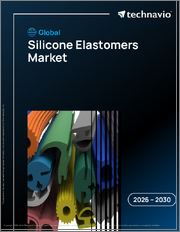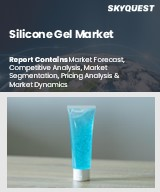
|
시장보고서
상품코드
1496186
실리콘 엘라스토머 시장 분석 : 용도별, 제품별, 지역별 분석과 예측(2024-2034년)Silicone Elastomers Market - A Global and Regional Analysis: Focus on End-use Industry, Process, Type, and Region - Analysis and Forecast, 2024-2034 |
||||||
세계 실리콘 엘라스토머 시장 규모는 다양한 요인과 새로운 동향에 힘입어 현저한 급성장을 이루고 있습니다.
낙관적으로 예측하면 2024년 시장 규모는 91억 달러에 달할 것으로 보이며 앞으로는 6.89%의 연평균 복합 성장률(CAGR)로 확대되고 2034년에는 177억 2,000만 달러에 달할 것으로 예측되고 있습니다. 이 성장 궤도를 뒷받침하고 있는 것은 실리콘 엘라스토머 수요가 다양한 산업에서 높아지고 있는 것이며, 특히 헬스케어나 자동차 분야에서는 그 우수한 특성이 다양한 용도에 필수적입니다.
| 주요 시장 통계 | |
|---|---|
| 예측 기간 | 2024-2034년 |
| 2024년 평가액 | 91억 달러 |
| 2034년 예측 | 177억 2,000만 달러 |
| CAGR | 6.89% |
재료과학의 혁신과 기술의 발전은 시장 성장을 가속하는데 매우 중요한 역할을 합니다. 헬스케어 용도에서의 실리콘 엘라스토머 수요 증가, 내구성의 향상, 생체 적합성 등 실리콘 엘라스토머 배합의 개발은 의료기기나 임플란트 등 산업의 진화하는 요구에 대응하여 수요를 촉진하고 있습니다. 게다가 전략적 투자, 제품 상시, 환경의 지속가능성과 안전기준을 촉진하는 규제상황이 시장 상황을 더욱 형성하고, 친환경 실리콘 엘라스토머의 채용을 추진하고 있습니다.
디지털화 및 제조 공정에 대한 전략적 투자도 시장 확대에 기여합니다. 산업이 효율성과 제품 품질을 점점 더 우선시함에 따라 우수한 성능 특성을 지닌 첨단 실리콘 엘라스토머에 대한 수요가 계속 증가하고 있습니다. 이러한 추세는 진화하는 소비자의 요구와 규제 요건을 충족시키려는 제조업체가 실리콘 탄성중합체를 광범위한 산업 분야의 주요 부품으로 자리매김하고 있기 때문에 앞으로도 계속될 것으로 예상됩니다.
본 보고서는 세계의 실리콘 엘라스토머 시장에 대해 조사했으며, 시장 개요와 함께 용도별, 제품별, 지역별 동향, 시장 진출기업프로파일 등의 정보를 제공합니다.
목차
주요 요약
제1장 시장 : 업계 전망
- 동향 : 현재 및 미래의 영향 평가
- 공급망 개요
- R&D 리뷰
- 규제 상황
- 이해관계자 분석
- 주요 세계 이벤트의 영향 분석
- 시장 역학 개요
제2장 실리콘 엘라스토머 시장(용도별)
- 용도의 세분화
- 용도 개요
- 실리콘 엘라스토머 시장(최종 이용 산업별)
제3장 실리콘 엘라스토머 시장(제품별)
- 제품 세분화
- 제품 개요
- 실리콘 엘라스토머 시장(유형별)
- 실리콘 엘라스토머 시장(프로세스별)
제4장 세계의 실리콘 엘라스토머 시장(지역별)
- 실리콘 엘라스토머 시장(지역별)
- 북미
- 유럽
- 아시아태평양
- 기타 지역
제5장 기업 프로파일
- 향후 전망
- 지리적 평가
- DOW, Inc.
- Wacker Chemie AG
- Momentive Performance Materials, Inc.
- SHIN-ETSU Chemical Co., Ltd.
- China National Bluestar Co, Ltd.
- Rogers Corporation
- Cabot Corporation
- Reiss Manufacturing Inc.
- MESGO SPA
- CHT GERMANY GMBH
- Bellofram Elastomers
- AB Specialty Silicones, LLC
- Specialty Silicone Products, Inc.
- DuPont de Nemours, Inc.
- Avantor, Inc.
- 기타
제6장 조사 방법
JHS 24.06.25Introduction to Silicone Elastomers Market
The global silicone elastomers market is experiencing a notable surge, driven by various factors and emerging trends. Projected optimistically, the market is valued at $9.10 billion in 2024 and is anticipated to expand at a CAGR of 6.89% to reach $17.72 billion by 2034. This growth trajectory is primarily propelled by the rising demand for silicone elastomers across diverse industries, particularly in healthcare and automotive sectors, where their exceptional properties are essential for various applications.
| KEY MARKET STATISTICS | |
|---|---|
| Forecast Period | 2024 - 2034 |
| 2024 Evaluation | $9.10 Billion |
| 2034 Forecast | $17.72 Billion |
| CAGR | 6.89% |
Innovations in material science and technological advancements play a pivotal role in driving market growth. Developments in silicone elastomer formulations, including increasing demand for silicone elastomers in healthcare applications, enhanced durability, and biocompatibility, cater to the evolving needs of industries such as medical devices and implants, driving demand. Additionally, strategic investments, product launches, regulatory initiatives promoting environmental sustainability and safety standards further shape the market landscape, encouraging the adoption of eco-friendly silicone elastomers. For instance, in 2022, Shin-Etsu Chemical Co., Ltd. announced an investment of USD 0.68 billion to expand its silicones business. The new facility investments will increase the production capacity of highly diversified types of silicone fluids, resins, and rubber end products. The global silicone elastomers market is not without its challenges which include, volatile raw material prices and a smaller number of skilled labour force.
Digitalization and strategic investments in manufacturing processes also contribute to market expansion. As industries increasingly prioritize efficiency and product quality, the demand for advanced silicone elastomers with superior performance characteristics continues to grow. This trend is expected to persist as manufacturers seek to meet evolving consumer demands and regulatory requirements, positioning silicone elastomers as a key component in a wide range of industrial applications.
Market Segmentation:
Segmentation 1: by End-use Industry
- Automotive and Transportation
- Electrical and Electronics
- Building and Construction
- Healthcare
- Consumer Goods
- Other End-use Industries
Segmentation 2: by Type
- High Temperature Vulcanized Rubber
- Room Temperature Vulcanized
- Liquid Silicone Rubber
- Others
Segmentation 3: by Process
- Extrusion
- Liquid Injection Molding
- Injection Molding
- Compression Molding
- Others
Segmentation 4: by Region
- North America
- Europe
- Asia-Pacific
- Rest-of-the-World
How can this Report add value to an Organization?
Product/Innovation Strategy: The global silicone elastomers market has been extensively segmented based on various categories, such as end-use industry, process, and type. This can help readers get a clear overview of which segments account for the largest share and which ones are well-positioned to grow in the coming years.
Competitive Strategy: A detailed competitive benchmarking of the players operating in the global silicone elastomers market has been done to help the reader understand how players stack against each other, presenting a clear market landscape. Additionally, comprehensive competitive strategies such as partnerships, agreements, and collaborations will aid the reader in understanding the untapped revenue pockets in the market.
Key Market Players and Competition Synopsis
The companies that are profiled have been selected based on thorough secondary research, which includes analyzing company coverage, product portfolio, market penetration, and insights gathered from primary experts.
Some of the prominent companies in this market are:
- DOW, Inc.
- Wacker Chemie AG
- Momentive Performance Materials, Inc.
- SHIN-ETSU Chemical Co., Ltd.
- China National Bluestar Co, Ltd.
- Rogers Corporation
- Cabot Corporation
- DuPont de Nemours, Inc.
Key Questions Answered in this Report:
- What are the main factors driving the demand for silicone elastomers market?
- What are the major patents filed by the companies active in the silicone elastomers market?
- Who are the key players in the silicone elastomers market, and what are their respective market shares?
- What partnerships or collaborations are prominent among stakeholders in the silicone elastomers market?
- What are the strategies adopted by the key companies to gain a competitive edge in silicone elastomers market?
- What is the futuristic outlook for the silicone elastomers market in terms of growth potential?
- What is the current estimation of the silicone elastomers market and what growth trajectory is projected from 2024 to 2034?
- Which application, and product segment is expected to lead the market over the forecast period (2024-2034)?
- What could be the impact of growing end-use industries in the silicone elastomers market?
- Which regions demonstrate the highest adoption rates for silicone elastomers market, and what factors contribute to their leadership?
Table of Contents
Executive Summary
Scope and Definition
Market/Product Definition
Key Questions Answered
Analysis and Forecast Note
1. Markets: Industry Outlook
- 1.1 Trends: Current and Future Impact Assessment
- 1.2 Supply Chain Overview
- 1.2.1 Value Chain Analysis
- 1.2.2 Pricing Forecast
- 1.3 R&D Review
- 1.3.1 Patent Filing Trend by Country, by Company
- 1.4 Regulatory Landscape
- 1.5 Stakeholder Analysis
- 1.5.1 Use Case
- 1.5.2 End User and Buying Criteria
- 1.6 Impact Analysis for Key Global Events
- 1.7 Market Dynamics Overview
- 1.7.1 Market Drivers
- 1.7.2 Market Restraints
- 1.7.3 Market Opportunities
2. Silicone Elastomers Market (by Application)
- 2.1 Application Segmentation
- 2.2 Application Summary
- 2.3 Silicone Elastomers Market (by End-Use Industry)
- 2.3.1 Automotive and Transportation
- 2.3.2 Electrical and Electronics
- 2.3.3 Building and Construction
- 2.3.4 Healthcare
- 2.3.5 Consumer Goods
- 2.3.6 Other End-use Industries
3. Silicone Elastomers Market (by Products)
- 3.1 Product Segmentation
- 3.2 Product Summary
- 3.3 Silicone Elastomers Market (by Type)
- 3.3.1 High Temperature Vulcanized Rubber
- 3.3.2 Room Temperature Vulcanized
- 3.3.3 Liquid Silicone Rubber
- 3.3.4 Others
- 3.4 Silicone Elastomers Market (by Process)
- 3.4.1 Extrusion
- 3.4.2 Liquid Injection Molding
- 3.4.3 Injection Molding
- 3.4.4 Compression Molding
- 3.4.5 Others
4. Global Silicone Elastomers Market (by Region)
- 4.1 Silicone Elastomers Market (by Region)
- 4.2 North America
- 4.2.1 Regional Overview
- 4.2.2 Driving Factors for Market Growth
- 4.2.3 Factors Challenging the Market
- 4.2.4 Application
- 4.2.5 Product
- 4.2.6 U.S.
- 4.2.6.1 Market by Application
- 4.2.6.2 Market by Product
- 4.2.7 Canada
- 4.2.7.1 Market by Application
- 4.2.7.2 Market by Product
- 4.2.8 Mexico
- 4.2.8.1 Market by Application
- 4.2.8.2 Market by Product
- 4.3 Europe
- 4.3.1 Regional Overview
- 4.3.2 Driving Factors for Market Growth
- 4.3.3 Factors Challenging the Market
- 4.3.4 Application
- 4.3.5 Product
- 4.3.6 Germany
- 4.3.6.1 Market by Application
- 4.3.6.2 Market by Product
- 4.3.7 France
- 4.3.7.1 Market by Application
- 4.3.7.2 Market by Product
- 4.3.8 U.K.
- 4.3.8.1 Market by Application
- 4.3.8.2 Market by Product
- 4.3.9 Italy
- 4.3.9.1 Market by Application
- 4.3.9.2 Market by Product
- 4.3.10 Rest-of-Europe
- 4.3.10.1 Market by Application
- 4.3.10.2 Market by Product
- 4.4 Asia-Pacific
- 4.4.1 Regional Overview
- 4.4.2 Driving Factors for Market Growth
- 4.4.3 Factors Challenging the Market
- 4.4.4 Application
- 4.4.5 Product
- 4.4.6 China
- 4.4.6.1 Market by Application
- 4.4.6.2 Market by Product
- 4.4.7 Japan
- 4.4.7.1 Market by Application
- 4.4.7.2 Market by Product
- 4.4.8 India
- 4.4.8.1 Market by Application
- 4.4.8.2 Market by Product
- 4.4.9 South Korea
- 4.4.9.1 Market by Application
- 4.4.9.2 Market by Product
- 4.4.10 Rest-of-Asia-Pacific
- 4.4.10.1 Market by Application
- 4.4.10.2 Market by Product
- 4.5 Rest-of-the-World
- 4.5.1 Regional Overview
- 4.5.2 Driving Factors for Market Growth
- 4.5.3 Factors Challenging the Market
- 4.5.4 Application
- 4.5.5 Product
- 4.5.6 South America
- 4.5.6.1 Market by Application
- 4.5.6.2 Market by Product
- 4.5.7 Middle East and Africa
- 4.5.7.1 Market by Application
- 4.5.7.2 Market by Product
5. Companies Profiled
- 5.1 Next Frontiers
- 5.2 Geographic Assessment
- 5.2.1 DOW, Inc.
- 5.2.1.1 Overview
- 5.2.1.2 Top Products/Product Portfolio
- 5.2.1.3 Top Competitors
- 5.2.1.4 Target Customers
- 5.2.1.5 Key Personnel
- 5.2.1.6 Analyst View
- 5.2.1.7 Market Share
- 5.2.2 Wacker Chemie AG
- 5.2.2.1 Overview
- 5.2.2.2 Top Products/Product Portfolio
- 5.2.2.3 Top Competitors
- 5.2.2.4 Target Customers
- 5.2.2.5 Key Personnel
- 5.2.2.6 Analyst View
- 5.2.2.7 Market Share
- 5.2.3 Momentive Performance Materials, Inc.
- 5.2.3.1 Overview
- 5.2.3.2 Top Products/Product Portfolio
- 5.2.3.3 Top Competitors
- 5.2.3.4 Target Customers
- 5.2.3.5 Key Personnel
- 5.2.3.6 Analyst View
- 5.2.3.7 Market Share
- 5.2.4 SHIN-ETSU Chemical Co., Ltd.
- 5.2.4.1 Overview
- 5.2.4.2 Top Products/Product Portfolio
- 5.2.4.3 Top Competitors
- 5.2.4.4 Target Customers
- 5.2.4.5 Key Personnel
- 5.2.4.6 Analyst View
- 5.2.4.7 Market Share
- 5.2.5 China National Bluestar Co, Ltd.
- 5.2.5.1 Overview
- 5.2.5.2 Top Products/Product Portfolio
- 5.2.5.3 Top Competitors
- 5.2.5.4 Target Customers
- 5.2.5.5 Key Personnel
- 5.2.5.6 Analyst View
- 5.2.5.7 Market Share
- 5.2.6 Rogers Corporation
- 5.2.6.1 Overview
- 5.2.6.2 Top Products/Product Portfolio
- 5.2.6.3 Top Competitors
- 5.2.6.4 Target Customers
- 5.2.6.5 Key Personnel
- 5.2.6.6 Analyst View
- 5.2.6.7 Market Share
- 5.2.7 Cabot Corporation
- 5.2.7.1 Overview
- 5.2.7.2 Top Products/Product Portfolio
- 5.2.7.3 Top Competitors
- 5.2.7.4 Target Customers
- 5.2.7.5 Key Personnel
- 5.2.7.6 Analyst View
- 5.2.7.7 Market Share
- 5.2.8 Reiss Manufacturing Inc.
- 5.2.8.1 Overview
- 5.2.8.2 Top Products/Product Portfolio
- 5.2.8.3 Top Competitors
- 5.2.8.4 Target Customers
- 5.2.8.5 Key Personnel
- 5.2.8.6 Analyst View
- 5.2.8.7 Market Share
- 5.2.9 MESGO S.P.A.
- 5.2.9.1 Overview
- 5.2.9.2 Top Products/Product Portfolio
- 5.2.9.3 Top Competitors
- 5.2.9.4 Target Customers
- 5.2.9.5 Key Personnel
- 5.2.9.6 Analyst View
- 5.2.9.7 Market Share
- 5.2.10 CHT GERMANY GMBH
- 5.2.10.1 Overview
- 5.2.10.2 Top Products/Product Portfolio
- 5.2.10.3 Top Competitors
- 5.2.10.4 Target Customers
- 5.2.10.5 Key Personnel
- 5.2.10.6 Analyst View
- 5.2.10.7 Market Share
- 5.2.11 Bellofram Elastomers
- 5.2.11.1 Overview
- 5.2.11.2 Top Products/Product Portfolio
- 5.2.11.3 Top Competitors
- 5.2.11.4 Target Customers
- 5.2.11.5 Key Personnel
- 5.2.11.6 Analyst View
- 5.2.11.7 Market Share
- 5.2.12 AB Specialty Silicones, LLC
- 5.2.12.1 Overview
- 5.2.12.2 Top Products/Product Portfolio
- 5.2.12.3 Top Competitors
- 5.2.12.4 Target Customers
- 5.2.12.5 Key Personnel
- 5.2.12.6 Analyst View
- 5.2.12.7 Market Share
- 5.2.13 Specialty Silicone Products, Inc.
- 5.2.13.1 Overview
- 5.2.13.2 Top Products/Product Portfolio
- 5.2.13.3 Top Competitors
- 5.2.13.4 Target Customers
- 5.2.13.5 Key Personnel
- 5.2.13.6 Analyst View
- 5.2.13.7 Market Share
- 5.2.14 DuPont de Nemours, Inc.
- 5.2.14.1 Overview
- 5.2.14.2 Top Products/Product Portfolio
- 5.2.14.3 Top Competitors
- 5.2.14.4 Target Customers
- 5.2.14.5 Key Personnel
- 5.2.14.6 Analyst View
- 5.2.14.7 Market Share
- 5.2.15 Avantor, Inc.
- 5.2.15.1 Overview
- 5.2.15.2 Top Products/Product Portfolio
- 5.2.15.3 Top Competitors
- 5.2.15.4 Target Customers
- 5.2.15.5 Key Personnel
- 5.2.15.6 Analyst View
- 5.2.15.7 Market Share
- 5.2.16 Others
- 5.2.1 DOW, Inc.



















